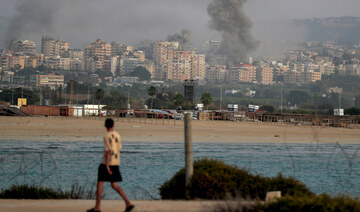JEDDAH: Sudanese authorities declared a state of emergency and imposed a curfew in West Darfur on Sunday after at least 129 people died in two days of fighting between tribal militias.
The violence is the worst since a peace agreement in October raised hopes of an end to years of war in Sudan’s western region.
Darfur is awash with weapons, but a joint UN-African Union peacekeeping mission had kept a lid on simmering tensions for 13 years.
The mission began pulling out its 8,000 staff when its mandate ended on Dec. 31, and fighting broke out on Saturday between rival tribes in Genena, the capital of West Darfur state.
It began as a local dispute, before quickly growing into widespread clashes among armed militias.
The head of Sudan’s ruling council, Gen. Abdel Fattah Al-Burhan, met security chiefs on Sunday to discuss the violence.

The Sudanese Professionals Association, the umbrella group that led protests against former dictator Omar Bashir, said the violence hit camps for internally displaced people.
“Parts of Kerindig camp were burned and sustained significant damage, forcing people to leave for safe areas,” it said. “These events show that the spread of weapons across Sudan, and especially in Darfur, are the main reasons for the deteriorating situation.”
The association said the violence showed the deficiencies of the October peace deal, which it said “strayed away from addressing the roots of the crisis in Darfur, and the issues of people who suffered the scourge of war, and the spread of weapons.”
Darfur was the scene of a bloody conflict that erupted in 2003, leaving around 300,000 people dead and 2.5 million displaced.
It began when ethnic minority rebels rose up against the government in Khartoum, which responded by recruiting and arming a notorious militia known as the Janjaweed.
The main conflict has subsided over the years but ethnic and tribal clashes still flare periodically, largely pitting nomadic tribes against settled farmers from other ethnic groups.
The violence often centers on land ownership and access to water.
Sudan has undergone a troubled transition since Bashir was ousted in April 2019. Two groups refused to join the October peace deal, including the Sudan Liberation Movement led by Abdelwahid Nour, which has considerable support in Darfur.
The clashes pose a challenge to efforts by Sudan’s transitional government to end decades-long rebellions in areas like Darfur, where most people live in camps for the displaced and refugees.
Sudan is on a fragile path to democracy and is being ruled by a joint military-civilian government.
That bout of violence came two weeks after the UN Security Council ended the joint UN-African Union peacekeeping force’s mandate in the region. The UNAMID force, established in 2007, is expected to complete its withdrawal by June 30.
It also puts into question the transitional government’s ability to stabilize the conflict-ravaged Darfur region.
Salah Saleh, a physician and former medical director at the main hospital in Genena, said clashes renewed Sunday morning at the Abu Zar camp for internally displaced people, south of the provincial capital.
He said most of the victims were shot dead, or suffered gunshot wounds.
Adam Regal, a spokesman for a local organization that helps run refugee camps in Darfur, said there were overnight attacks on Krinding. He shared footage showing properties burned to the ground, and wounded people on stretchers and in hospital beds.
Authorities in West Darfur imposed a curfew beginning Saturday that includes the closing of all markets and a ban on public gatherings. The central government in Khartoum also said Saturday a high-ranking delegation, chaired by the country’s top prosecutor, was heading to the province to help re-establish order.
A database by the UN Office for the Coordination of Humanitarian Affairs, OCHA, showed that inter-communal violence across Darfur region doubled in the second half of 2020, with at least 28 incidents compared to 15 between July and December 2019.
West Darfur province experienced a “significant increase” of violence last year, with half of the 40 incidents reported in the entire Darfur region, OCHA said Sunday.
(With agencies)


























